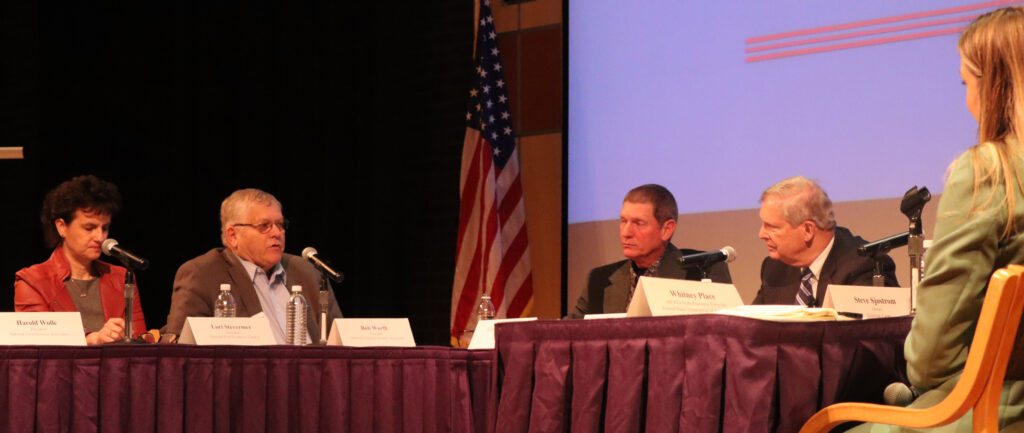Soybean harvest is ramping up across Minnesota and will soon be in full swing. Before they find themselves up to their necks in harvest duties, the Minnesota Soybean Growers Association (MSGA) officer team headed to Washington, D.C., Sept. 18-20 to meet with legislators and hammer home MSGA’s federal policy priorities.
MSGA President Bob Worth, Vice President Darin Johnson, Treasurer Ryan Mackenthun and Secretary Rose Wendinger all attended the jam-packed, 48-hour visit to the nation’s capital. The group wasted no time getting to work. Before beginning their official visits on Tuesday morning – which included meetings with Sen. Amy Klobuchar, Reps. Michelle Fischbach, Brad Finstad, Pete Stauber, Tom Emmer and Sen. Tina Smith, respectively – Rep. Finstad guided the group on a tour of the Capitol building Monday night.
“This place is so impressive, especially at night,” Worth said. “It gives me goosebumps for sure.”
Unsurprisingly, the upcoming Farm Bill was the big-ticket item during conversations with legislators. In the next Farm Bill, MSGA is encouraging lawmakers to not only protect crop insurance, but strengthen it.
“Crop insurance is so important for us,” Worth told Rep. Finstad, who farms in New Ulm. “It’s good. Let’s make it great.”
In past years, Congress has authorized ad hoc disaster assistance programs for growers hit hard by natural disasters. But these programs often take one to three years to pay out and aren’t guaranteed.
“Young producers can’t absorb the loss of waiting two years for the ad hoc money,” Mackenthun said. “We need young people in farming and crop insurance minimizes the risk for young farmers.”
By replacing ad hoc programs with stronger and more affordable crop insurance, growers will be better prepared for curveballs thrown their way.
“As farmers, we deal with a lot of inconsistencies,” Johnson said. “Crop insurance provides us with consistency.”
Above all, MSGA officers emphasized the importance of passing a sound and timely Farm Bill. And time isn’t on Congress’ side – the existing Farm Bill expires Sept. 30.
“We don’t want to pass a Farm Bill just to pass a Farm Bill,” Worth said.
Supporting the checkoff
MSGA also showed its support for the Minnesota Soybean Research & Promotion Council (MSR&PC) by stressing the value of the Minnesota soybean checkoff. The Opportunities for Fairness in Farming (OFF) act, introduced by Sen. Cory Booker and Sen. Mike Lee, threatens the checkoff program by failing to recognize the existing oversight of USDA and the Minnesota Department of Agriculture, growers said.

“The soybean checkoff is working, and we want everyone to know that,” Johnson said in a conversation with Rep. Fischbach in the congresswoman’s office. “For every $1.00 invested in the soy checkoff, growers see a $12.34 return on investment.”
Moreover, results from the last checkoff referendum show that only about 700 soybean farmers of the nation’s 500,000 wanted to terminate the soy checkoff, far below the required threshold.
“If there is a problem with a specific checkoff, target that checkoff,” Worth said. “We don’t need a blanket act.”
Biodiesel was another topic of frequent discussion. As the first state to pass a biodiesel mandate in 2002, Minnesota remains a trailblazer in the industry. Worth, who first served as president when B2 was implemented nearly 20 years ago, continues to promote biodiesel, which helps clean Minnesota’s air and boost the state’s economy,
“We want this product used forever,” Worth said. “We know electric cars are coming, but don’t forget about biodiesel. Electric cars aren’t practical in every situation and biodiesel is an environmentally friendly option that is working now.”
Joining the officer team was Acting Ag Innovation Campus (AIC) CEO Tom Slunecka, who advocated for additional funding for Phase 2 and 3 of the crush plant. Following the Sept. 14 Grand Opening, the AIC is gearing up to secure the remaining funding required to complete the vision.
“The impact of what we’re going to be doing there has national and international scope,” Slunecka said. “The crush plant is a not-for-profit, which will invest in new technologies and new companies, whether they be big or small. If we can get that up and running, we’ll be able to bring new technologies to agriculture and consumers. It’s going to serve the public.”
Not only did MSGA meet with their legislators, but they also visited the Japanese and Vietnamese Embassies, along with the U.S.–China Business Council. Conversations with these entities centered around Minnesota soybean farmers’ dedication to growing a high-quality product, sustainably.
For example, Worth and Johnson are both enrolled in MDA’s Ag Water Quality Certification Program, while Mackenthun and Wendinger are currently in the process of becoming certified. Additionally, Minnesota biodiesel mandate makes operating machinery more environmentally friendly compared to traditional diesel.
“Our soybeans are of high quality – they have the lowest foreign material content in the nation and have an excellent amino acid profile,” Worth said. “And our farmers are natural stewards of the land. Buying our products mean that you receive a high-quality product that is sustainably grown.”
MSGA rounded out the Hill Visits with a trip to United States Department of Agriculture – National Agricultural Statistics Survey (NASS). Considered a pain by many Minnesota growers, the surveys distributed by NASS are a valuable tool.
“The biggest thing you can do is convince your neighbors, friends and family to take a few moments to fill out the survey,” said NASS Chief of U.S. Crops Branch Lance Honig. “Information is power, and if we stop, the big players are going to keep doing it. We’re the only objective entity doing this work.”
After a successful visit to D.C., Minnesota’s soybean growers can rest assured this harvest knowing that MSGA is speaking up for them Washington, D.C., and St. Paul.
“It was a very fast-paced couple of days with a lot of meetings, this was fantastic group to work with,” Worth said. “It is so good that the officers of MSGA get this chance to lobby together.”




